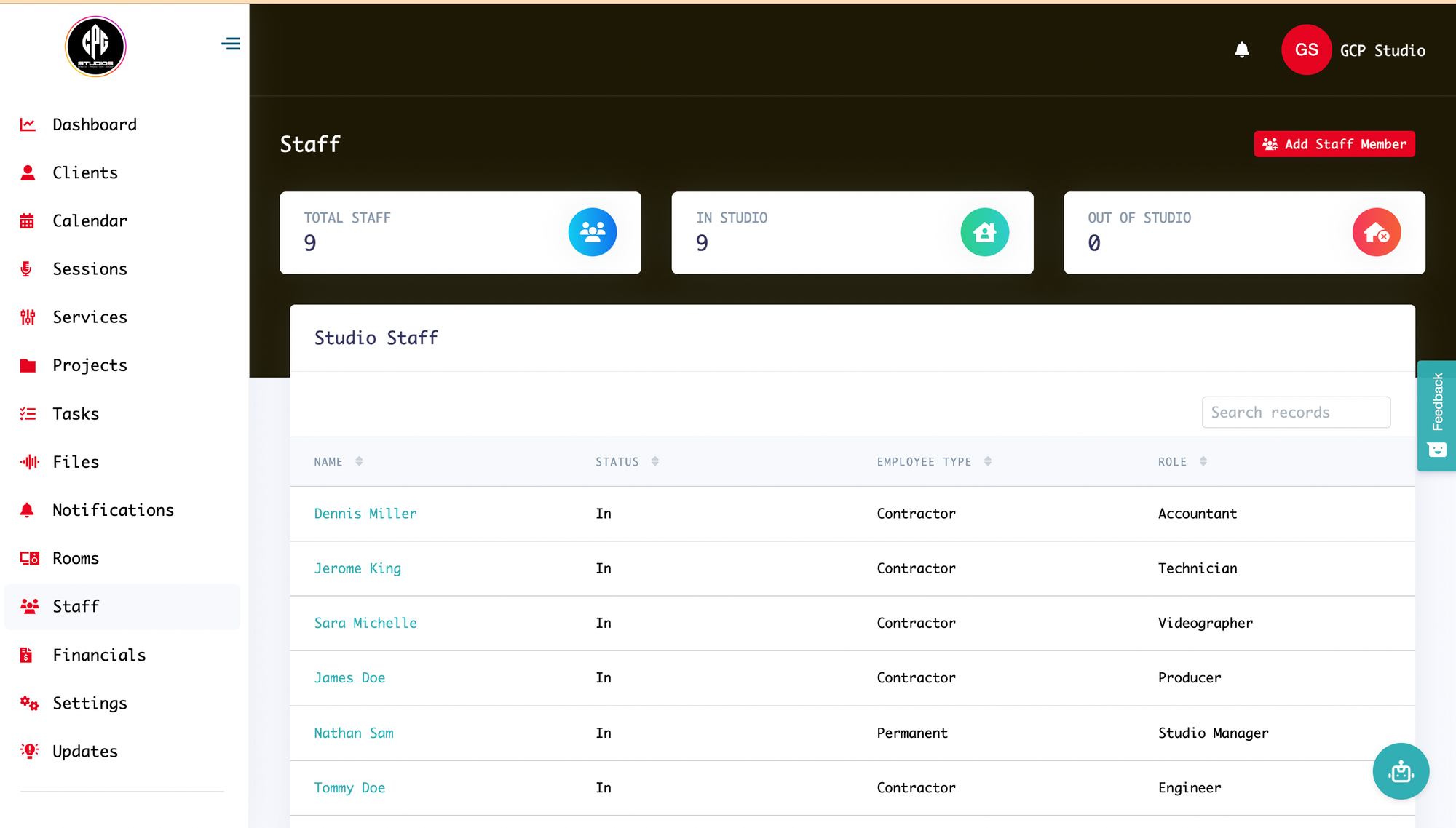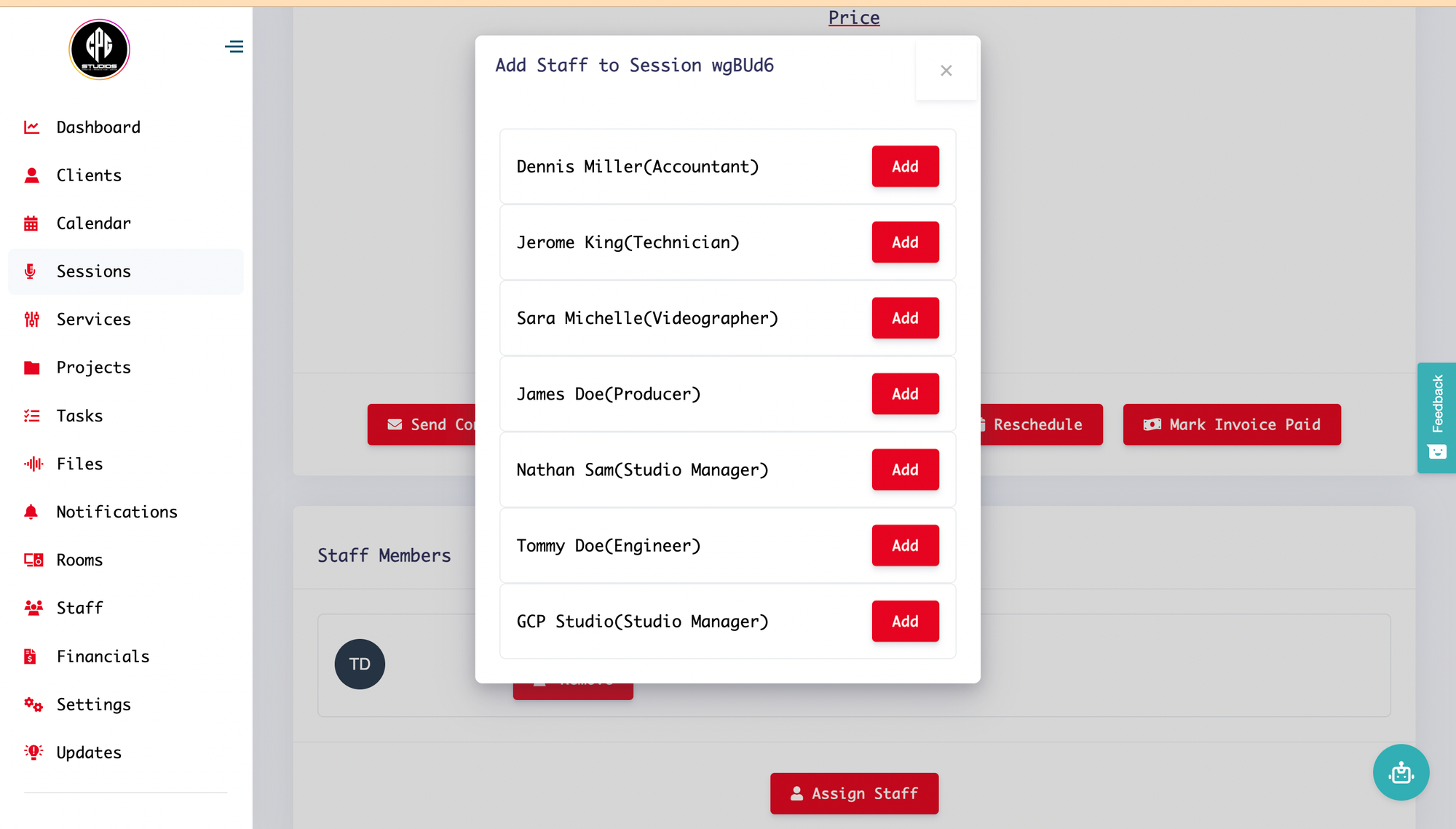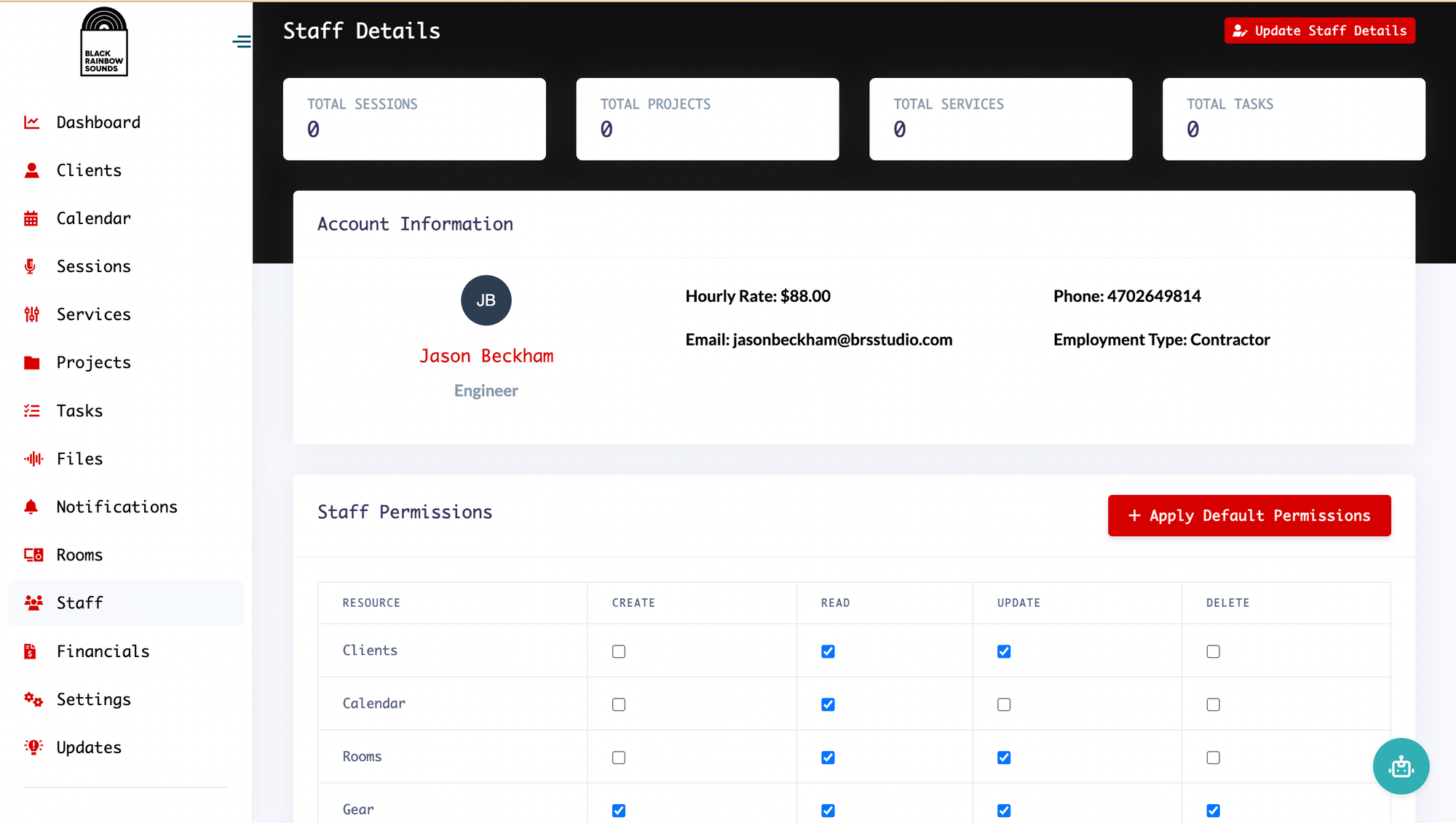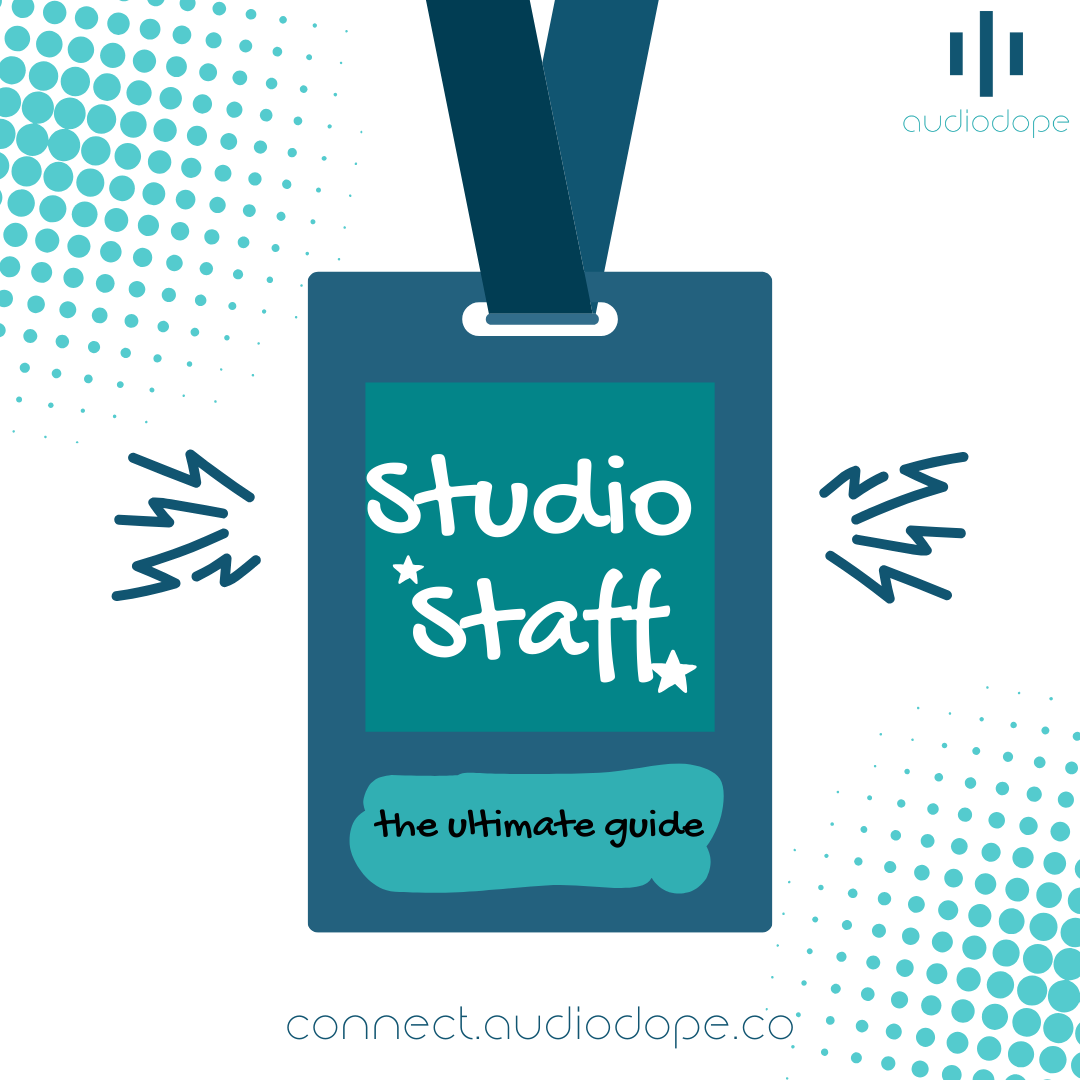The Ultimate Guide to Recording Studio Staff Management

In our previous discussion, we talked about managing payroll in the Recording Studio. Payroll directly affects the highest expense in the studio, the Studio Staff. Effective studio staff management plays a pivotal role in ensuring a smooth and successful recording process.
As an studio operator, it is imperative to understand the intricate dynamics that come into play when managing a team of skilled individuals, each with their unique talents and responsibilities.
Effective studio staff management is akin to conducting an orchestra, where every member's contribution is essential to creating a harmonious symphony. It involves a delicate balance of leadership, communication, and strategic planning, all aimed at maximizing productivity, fostering creativity, and delivering exceptional results.
In this comprehensive guide, we will share our insights and best practices for managing studio staff, drawing from years of hands-on experience in the recording industry.
Understanding the roles and responsibilities of Studio Staff
A recording studio is a microcosm of diverse roles and responsibilities, each playing a crucial part in the overall success of a project. Before delving into the intricacies of studio staff management, it is essential to understand the various positions and their respective duties. You can also refer to our previous discussion on "What are the Roles in the Recording Studio?" for more information.
- Recording Engineer: The recording engineer is the technical mastermind responsible for capturing and manipulating sound during the recording process. Their responsibilities include setting up microphones, operating the recording console, and ensuring optimal audio quality.
- Assistant Engineer: As the name suggests, the assistant engineer supports the recording engineer by handling tasks such as cable management, microphone setup, and equipment maintenance.
- Producer: The producer is the creative visionary who oversees the entire recording process, guiding the artists and shaping the overall sound and direction of the project.
- Studio Manager: The studio manager is the administrative backbone of the studio, handling tasks such as scheduling, client relations, and ensuring the smooth operation of the facility.
- Maintenance Staff: The maintenance staff is responsible for keeping the studio in top condition, performing regular equipment checks, and addressing any technical issues that may arise.
By understanding the distinct roles and responsibilities of each studio staff member, you can better allocate tasks, facilitate collaboration, and ensure that everyone is working towards a common goal.

The importance of effective Studio Staff Management
Effective studio staff management is the cornerstone of a successful recording studio operation. It not only ensures smooth workflow and optimal resource utilization but also fosters an environment conducive to creativity and professional growth. Here are some key reasons why effective studio staff management is crucial:
- Increased Productivity: By streamlining processes, minimizing miscommunication, and optimizing workflow, effective studio staff management leads to increased productivity, allowing for more efficient use of studio time and resources.
- Enhanced Creativity: When studio staff feel valued, supported, and empowered, they are more likely to contribute their unique perspectives and ideas, leading to a more collaborative and creative environment.
- Improved Client Satisfaction: A well-managed studio staff is better equipped to deliver exceptional service and meet client expectations, resulting in increased client satisfaction and repeat business.
- Professional Development: Effective studio staff management provides opportunities for training, mentorship, and skill development, ensuring that your team remains at the forefront of industry trends and technological advancements.
- Conflict Resolution: By establishing clear communication channels and addressing issues promptly, effective studio staff management helps mitigate conflicts and maintain a positive and productive work environment.
Recognizing the importance of effective studio staff management is the first step towards creating a thriving and successful recording studio.
Hiring the right Studio Staff
Building a strong and cohesive studio staff is the foundation of effective management. The hiring process is crucial, as it sets the tone for the team's dynamics and overall performance. Here are some key considerations when hiring studio staff:
- Technical Expertise: Evaluate candidates' technical skills, knowledge, and experience to ensure they possess the necessary qualifications for the role. Conduct practical assessments or simulations to gauge their abilities in real-world scenarios.
- Passion and Creativity: While technical skills are essential, it is equally important to hire individuals who are passionate about music and possess a creative mindset. These qualities can contribute to a more collaborative and innovative studio environment.
- Communication and Interpersonal Skills: Effective communication and the ability to work well with others are paramount in a studio setting. Look for candidates who demonstrate strong interpersonal skills and the ability to collaborate effectively with artists, producers, and fellow staff members.
- Problem-Solving Abilities: Recording sessions can often present unexpected challenges and technical issues. Hire individuals who are adept at problem-solving, able to think on their feet, and capable of finding creative solutions under pressure.
- Cultural Fit: Assess whether a candidate's personality and work ethic align with the studio's culture and values. A cohesive team that shares a common vision and work ethic can greatly enhance productivity and overall job satisfaction.

Remember, hiring the right studio staff is an investment in the long-term success of your recording studio. Take the time to carefully evaluate candidates and prioritize not only their skills but also their ability to contribute to a positive and productive work environment.
Training and development of Studio Staff
Continuous training and development are essential for maintaining a skilled and knowledgeable studio staff. In an industry that is constantly evolving, providing opportunities for professional growth not only enhances your team's capabilities but also fosters a culture of learning and innovation. Here are some strategies for effective training and development:
- Mentorship Programs: Implement a mentorship program where experienced staff members share their knowledge and expertise with junior team members. This not only facilitates knowledge transfer but also promotes a collaborative and supportive work environment.
- On-the-Job Training: Encourage hands-on learning by providing opportunities for staff members to work on diverse projects and gain practical experience under the guidance of seasoned professionals.
- Workshops and Seminars: Organize or sponsor workshops, seminars, and industry events that cover relevant topics, emerging technologies, and best practices in the recording industry.
- Online Learning Resources: Provide access to online courses, tutorials, and educational platforms that allow staff members to expand their knowledge and stay up-to-date with industry trends at their own pace.
- Cross-Training: Encourage staff members to learn and understand each other's roles and responsibilities. Cross-training not only promotes versatility but also fosters a deeper appreciation for the contributions of every team member.

By investing in the training and development of your studio staff, you not only enhance their skills and knowledge but also demonstrate your commitment to their professional growth. This, in turn, can lead to increased job satisfaction, employee retention, and a more capable and motivated team.
Communication and teamwork in the Recording Studio
Effective communication and teamwork are the linchpins of a successful recording studio operation. In an environment where collaboration is essential, fostering open and clear communication channels is crucial. Here are some strategies to promote effective communication and teamwork:
- Regular Team Meetings: Conduct regular team meetings to discuss ongoing projects, share updates, and address any concerns or challenges. These meetings provide a platform for open dialogue and ensure that everyone is on the same page.
- Open-Door Policy: Encourage an open-door policy where staff members feel comfortable approaching management or their colleagues with questions, ideas, or concerns. This fosters a culture of transparency and trust.
- Collaborative Tools: Implement collaborative tools and software that facilitate real-time communication, file sharing, and project management. These tools can streamline workflow and enhance coordination among team members.
- Team-Building Activities: Organize team-building activities that promote bonding, trust, and a sense of camaraderie among staff members. These activities can help break down barriers and foster a more cohesive and collaborative work environment.
- Constructive Feedback: Encourage a culture of constructive feedback, where staff members feel comfortable providing and receiving feedback in a respectful and supportive manner. This not only promotes professional growth but also fosters a sense of accountability and continuous improvement.
Effective communication and teamwork are not only essential for day-to-day operations but also play a crucial role in fostering a positive and productive work environment. By prioritizing these aspects, you create a studio culture that values collaboration, respect, and open dialogue, ultimately contributing to the success of your projects and the overall well-being of your staff.
Managing conflicts and resolving issues in the studio
Conflicts and issues are inevitable in any work environment, and recording studios are no exception. However, effective conflict management and issue resolution are key to maintaining a harmonious and productive studio atmosphere. Here are some strategies for managing conflicts and resolving issues:
- Establish Clear Policies and Procedures: Develop and communicate clear policies and procedures for addressing conflicts and issues. This ensures a consistent and fair approach to conflict resolution and sets expectations for all staff members.
- Active Listening and Open Communication: When conflicts arise, practice active listening and encourage open communication. Allow all parties involved to express their perspectives and concerns in a respectful and non-judgmental manner.
- Mediation and Conflict Resolution Training: Consider providing mediation and conflict resolution training to key staff members or engaging the services of a professional mediator when necessary. This equips your team with the skills to navigate and resolve conflicts effectively.
- Root Cause Analysis: Rather than addressing surface-level issues, strive to identify and address the underlying root causes of conflicts or problems. This proactive approach can help prevent similar issues from recurring in the future.
- Collaborative Problem-Solving: Encourage a collaborative approach to problem-solving, where all stakeholders are involved in finding mutually agreeable solutions. This fosters a sense of ownership and increases the likelihood of successful implementation.
Remember, managing conflicts and resolving issues effectively not only mitigates disruptions but also promotes a healthy and productive work environment. By addressing conflicts promptly and with sensitivity, you demonstrate your commitment to creating a positive studio culture and foster trust and respect among your staff.
Ensuring safety and security for Studio Staff
Safety and security are paramount considerations in any recording studio environment. Protecting your staff, clients, and valuable equipment is not only a legal obligation but also essential for maintaining a productive and trustworthy studio operation. Here are some strategies for ensuring safety and security:
- Implement Safety Protocols: Develop and implement comprehensive safety protocols that address potential hazards, such as electrical safety, noise exposure, and ergonomic considerations. Provide regular safety training and ensure that all staff members are familiar with these protocols.
- Secure Access Control: Implement access control measures, such as key cards or biometric systems, to restrict unauthorized access to the studio premises. This helps protect your staff, clients, and equipment from potential security threats.
- Equipment Maintenance and Inspection: Establish regular maintenance and inspection schedules for all studio equipment, including electrical systems, audio gear, and safety equipment. Promptly address any issues or deficiencies to ensure the safety and proper functioning of your equipment.
- Emergency Preparedness: Develop and communicate emergency preparedness plans that outline procedures for various scenarios, such as fire, natural disasters, or medical emergencies. Conduct regular drills and ensure that all staff members are trained in emergency response protocols.
- Data Security and Backup Protocols: Implement robust data security measures, including encryption, access controls, and regular backups, to protect sensitive client data and project files from unauthorized access or loss.
By prioritizing safety and security, you not only create a safer and more secure work environment but also demonstrate your commitment to protecting your staff, clients, and valuable assets. This can foster a sense of trust and confidence in your studio's operations, ultimately contributing to your overall success and reputation.
Efficient scheduling and time management for Studio Staff
In the fast-paced and deadline-driven world of recording studios, efficient scheduling and time management are crucial for maximizing productivity and ensuring smooth operations.
Effective scheduling not only helps optimize resource utilization but also contributes to a more organized and stress-free work environment. Here are some strategies for efficient scheduling and time management:
- Centralized Scheduling System: Implement a centralized scheduling system that provides a comprehensive overview of studio bookings, staff availability, and project timelines. This streamlines the scheduling process and minimizes the risk of double-bookings or scheduling conflicts.
- Realistic Project Timelines: Work closely with clients and producers to establish realistic project timelines, taking into account factors such as the complexity of the project, studio availability, and staff workload. This helps manage expectations and ensures that deadlines are met without compromising quality.
- Buffer Time and Contingency Planning: Build in buffer time and contingency plans to account for unexpected delays or issues that may arise during the recording process. This proactive approach helps mitigate stress and ensures that projects stay on track.
- Time Tracking and Reporting: Implement time tracking and reporting systems to monitor project progress, identify potential bottlenecks, and make data-driven decisions about resource allocation and scheduling.
- Prioritization and Task Management: Encourage your staff to prioritize tasks and manage their workloads effectively. Provide training on time management techniques, such as the Eisenhower Matrix or the Pomodoro Technique, to help them stay focused and productive.

Efficient scheduling and time management not only contribute to a more organized and productive studio environment but also foster a sense of professionalism and reliability among your clients.
By optimizing your scheduling processes and empowering your staff with effective time management skills, you can ensure that projects are completed on time, within budget, and to the highest standards of quality.
Tools and software for studio staff management
In today's digital age, leveraging the right tools and software can greatly enhance studio staff management and streamline operations. From project management platforms to communication tools, these technologies can help you stay organized, collaborate effectively, and optimize workflows. Here are some essential tools and software for effective studio staff management:
- Project Management Software: Platforms like Trello, Asana, or Basecamp can help you manage projects, assign tasks, track progress, and collaborate with your team in real-time. These tools provide a centralized hub for project-related information, ensuring transparency and accountability.
- Communication and Collaboration Tools: Applications like Slack, Microsoft Teams, or Zoom enable seamless communication and collaboration among studio staff, regardless of their physical location. These tools facilitate instant messaging, video conferencing, and file sharing, ensuring that everyone is on the same page.
- Time Tracking and Invoicing Software: Solutions like Quickbooks, Xero, or FreshBooks can help you track billable hours, monitor project budgets, and generate accurate invoices for clients. These tools provide valuable insights into resource utilization and project profitability.
- Cloud Storage and File Sharing: Services like Dropbox, Google Drive, or Box enable secure file storage and sharing, allowing your team to collaborate on projects seamlessly and access files from anywhere.
- Studio Management Software: Specialized software like AudioDope, PreSonus Studio One, or Avid Pro Tools | Control offer comprehensive studio management capabilities, including session scheduling, equipment tracking, and client management, all within a single platform. Check to see if the platform offers integrations from other software to connect all your data together in one place.

When selecting tools and software for your studio, consider factors such as ease of use, compatibility with existing systems, scalability, and security features. Additionally, provide comprehensive training and support to ensure that your staff can effectively leverage these technologies to enhance productivity and efficiency.
Studio Staff Management best practices
Throughout years of experience in the recording industry, our team have learned that effective studio staff management is not just about implementing strategies and tools but also about embracing a set of best practices that foster a positive and productive work environment. Here are some key best practices to consider:
- Lead by Example: As a studio manager or leader, it is essential to lead by example. Demonstrate the values, work ethic, and professionalism you expect from your staff. This sets the tone for the entire team and encourages others to follow suit.
- Encourage Open Communication: Foster an environment of open communication where staff members feel comfortable voicing their concerns, ideas, and feedback. Actively listen to their perspectives and address any issues promptly and transparently.
- Recognize and Appreciate Contributions: Regularly recognize and appreciate the contributions of your staff, both individually and as a team. This can be through formal recognition programs, public acknowledgments, or simple gestures of gratitude. A culture of appreciation fosters motivation and job satisfaction.
- Promote Continuous Learning: Encourage your staff to continuously develop their skills and knowledge by providing access to training resources, workshops, and professional development opportunities. This not only enhances their capabilities but also demonstrates your investment in their growth.
- Embrace Diversity and Inclusion: Cultivate a diverse and inclusive studio environment that values different perspectives, backgrounds, and experiences. This fosters creativity, innovation, and a sense of belonging among your staff.
- Foster a Positive Work-Life Balance: Recognize the importance of work-life balance and encourage your staff to prioritize their well-being. Offer flexible work arrangements, promote healthy habits, and create a supportive environment that values personal and professional growth.
- Seek Feedback and Continuously Improve: Regularly seek feedback from your staff, clients, and industry peers. Use this feedback to identify areas for improvement and continuously refine your studio staff management practices.
Conclusion
Effective studio staff management is the cornerstone of a successful and thriving recording studio operation. It involves a delicate balance of leadership, communication, strategic planning, and a deep understanding of the diverse roles and responsibilities within the studio environment.
Throughout this comprehensive guide, we have explored the importance of hiring the right staff, providing continuous training and development opportunities, fostering effective communication and teamwork, managing conflicts and resolving issues, ensuring safety and security, optimizing schedules, and leveraging the right tools and software.
By embracing the best practices outlined in this guide, you can create a positive and productive studio culture that fosters creativity, collaboration, and a commitment to excellence.


